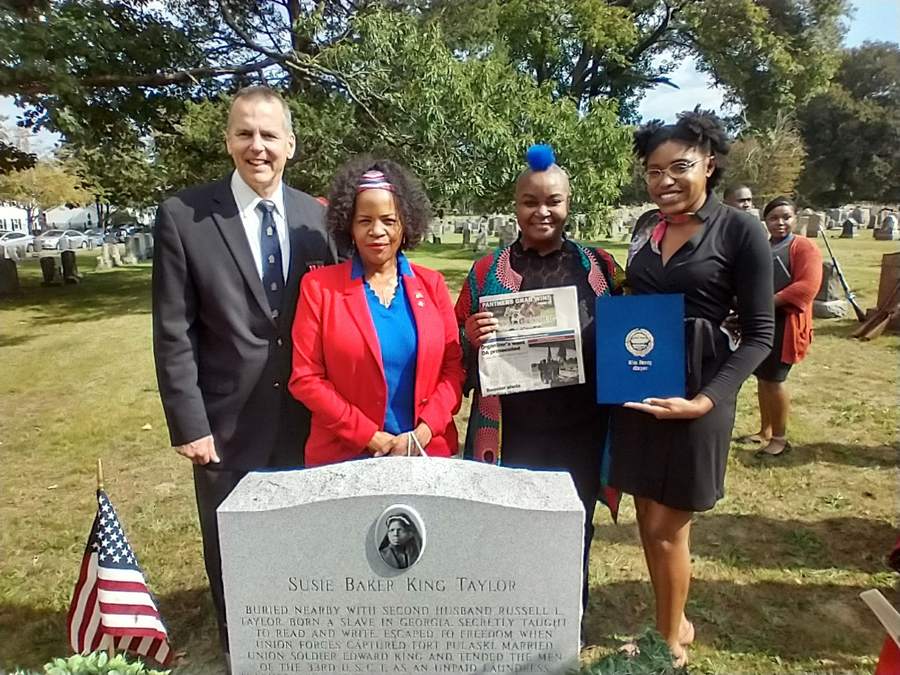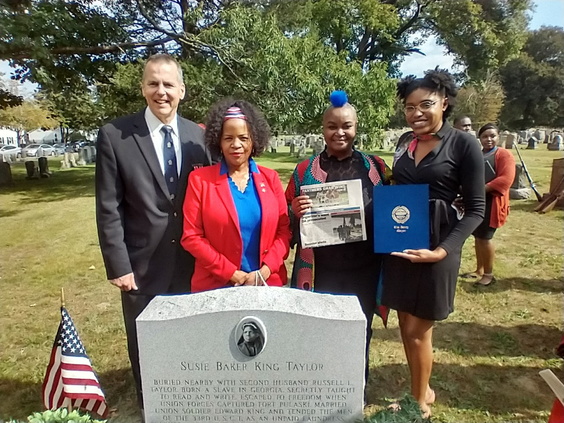After 109 years since her death, Liberty County native Susie King Taylor was honored at a program of dedication for a special monument and a headstone engravement in Boston, Massachusetts over the weekend.
Hermina Glass-Hill, founder and executive director of the Susie King Taylor Women's Institute and Ecology Center, attended the event to represent the state of Georgia and Taylor's hometowns of Midway and Savannah. The event was held at Mount Hope Cemetery in Boston, Massachusetts where Taylor is buried. It was sponsored by the Department of Massachusetts Sons of Union Veterans of the Civil War (SUVCW), a fraternal organization descended from the Grand Army of the Republic (G.A.R.) and dedicated to preserving the history and legacy of heroes who fought to save the Union and end slavery.
The keynote address was given by the Mayor of Boston, Kim Janey, the first woman and African American to serve in that role since the city's founding in 1630. While identifying with the Civil War heroine's story, Mayor Janey also credited her success to women like Susie King Taylor and others who paved the way.
The event also included posting of the colors of the U.S. flag, Taps played by the Providence Brigade Band, a decorated vacant chair symbolically guarded by a Union soldier, and a monument unveiling by SUVCW's Commander-in-Chief Michael Paquette and the mayor. The beautiful monument has a ceramic cameo of Susie King Taylor embedded in the granite along with a brief biography. Susie King Taylor was born enslaved and raised in a Gullah Geechee community in Midway, Liberty County, GA. She attended secret schools run by free people of color in Savannah from the age of five until the Civil War began in 1861. In 1862, she rebelled against plantation slavery in Midway with her feet and was rescued by the Union Army. While under the army's protection, she became Georgia's first federally funded teacher in a contraband camp on St. Simons Island, and later a nurse, musket cleaner, laundress, and cook with the country's first African American army regiment -the 1st S.C. Volunteers (African descent) which was later redesignated as the 33rd United States Colored Troops. After the war she returned to Savannah and Midway to open three schools. Finding it very difficult to support herself and her new baby, the widow closed her last school in Savannah and migrated North to Boston in search of better economic and social opportunities. In 1884, she joined the Massachusetts Department of the Woman's Relief Corp (WRC) in Boston. She even organized Corps No. 67, an all-Black WRC in the city known as "The Cradle of Liberty." In 1902, Taylor wrote and self-published her memoir, Reminiscences of My Life in Camp with the 33rd United States Colored Troops. In the book she wrote: "I was born on the Grest Farm (which was on an island known as Isle of Wight), Liberty County, about thirty-five miles from Savannah, Ga., on August 6, 1848, my mother being waitress for the Grest family.
Susie King Taylor's name has finally been etched in stone in Boston. In addition to the monument, the SUVCW sponsored the inscription of her name in the headstone that marks her actual burial site in Mount Hope Cemetery. Initially, the grave marker only contained her second husband's name, Russell L. Taylor (1854-1901). Cemetery records indicated that she was buried on top of him in 1912. For many decades various historians, authors, and womens' organizations have written of Taylor's importance in American history, but no one in Boston had explored acknowledging her final resting place until May 2019 when UNC-Charlotte graduate student Rebecca Byrd-Smith, a native from Roxbury, MA, presented a paper on veteran Susie King Taylor for the Suffrage centennial. Later that year, the Massachusetts SUVCW, including the Col. Robert Gould Shaw Camp 54, assumed the cost of the monument as well as engraving Taylor's name on the headstone.
The master of ceremony, SUVCW Vice Commander Roderick Fraser, Jr. (US Navy, retired) acknowledged Hermina Glass-Hill as a representative of the National Woman's Relief Corps (WRC), the order's sister organization. During her thirty-three years in Boston, Taylor was an active member of the Department of Massachusetts' WRC and in the late 1880s she formed the all-Black Corps. No. 67 in Boston serving as its president for more than three terms. Hermina Glass-Hill gifted Boston's Mayor Kim Janey with a handmande brooch-necklace of Susie King Taylor and, in turn, the City of Boston's mayor reciprocated with a special proclamation honoring Georgia's heroine of freedom. It will be displayed in the Susie King Taylor exhibition currently at the Liberty County Historical Society in Downtown Hinesville.
The Susie King Taylor Women's Institute and Ecology Center is planning to build the Susie King Taylor Escape to Freedoom Underground Railroad Park in Liberty County, Georgia.
For more information, please contact Hermina Glass-Hill at hermina@susiekingtaylorinstitute.org

